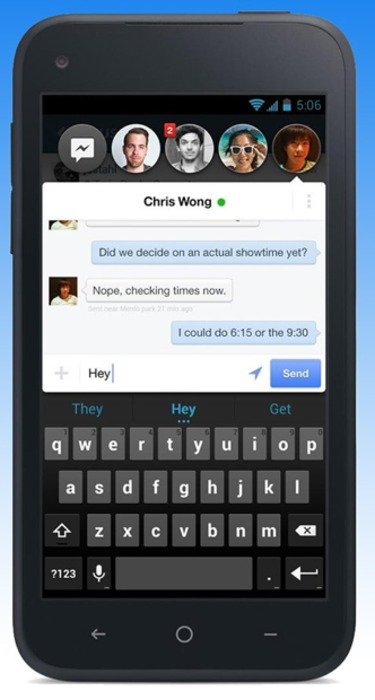Credit: Facebook
"Facebook Home" for Android phones, creating an "all Facebook all the time" home screen, can be seen as an "all in" bet by the social networking company, pushing its stack of chips from the desktop computing arena to where it sees its future -- mobile.
Announced last Thursday, Facebook Home will transform a phone's home screen into something called "Cover Feed," a small-screen version of the News Feed familiar to desktop computer devotees of Facebook. Home will also highlight a new version of messaging Facebook calls "Chat Heads," with notifications that include pictures of a user's Facebook friends.
Facebook Home can be seen as attempt to leapfrog past Android -- and its maker Google -- in effect taking over Android phones by pushing Facebook messages, photographs and updates directly to users' home screens.
"We want to bring all this content to the front," Facebook founder Mark Zuckerberg said at the Home introduction at the company's Menlo Park, Calif., headquarters.
Sitting on top of Android, Facebook Home can be downloaded to a selection of phones starting April 12.
While at least one company, HTC, has announced it will offer a phone with Facebook Home pre-installed, Facebook founder Mark Zuckerberg has wisely avoided the temptation to take his company into the hardware business. There will be no dedicated Facebook Phone, he said.
"We're not building a phone and we're not building an operating system," he said. "We're building something a whole lot deeper than an ordinary app."
Zuckerberg has long seen mobile as the way forward for his company, but even though there have been dedicated Facebook apps available for both iOS and Android phones for some time, it was felt not enough people were using Facebook on their mobile phones.
And even when they did, the problem for Facebook was finding a way to put relevant advertising in front of them, which is how Facebook creates revenue from the millions of people viewing the site on their desktop computers.
At the launch event , Zuckerberg said advertisements would not be a part of Facebook Home at first but would become a part of the Home "experience" at some time in the future.
That's a wise move on Zuckerberg's part. The point of Home is to first allow Facebook to learn what people do most on their smartphones. Once that information begins flowing in, Facebook will be in a position to begin to provide targeted ads and control when and where they appear.
Facebook clearly sees mobile as the way forward. Of its nearly 1 billion monthly users, 680 million now access the social network from a mobile device.
Even prior to its problem-plagued IPO stock offering last year, the company had conceded it had to come up with a better strategy for the mobile arena.
Facebook Home is obviously that strategy, and shareholders and analysts alike will be watching closely to see if the supercharged mobile version of the social network becomes the success on which Zuckerberg is no doubt counting.















